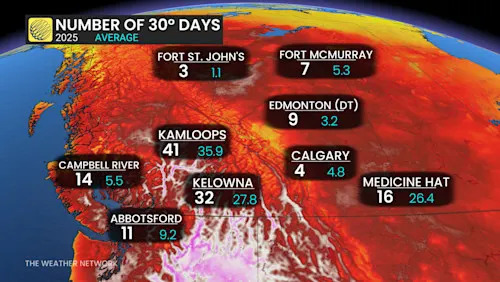Top Stories
B.C. and Alberta Sizzle as Record Heat Fuels Wildfire Threats

URGENT UPDATE: A blistering heat wave is gripping western Canada as British Columbia and Alberta break temperature records this late August. The village of Lytton, B.C., infamous for its extreme temperatures, reached a staggering 41.3°C on August 28, marking the highest temperature recorded in Canada this year. This follows Lytton’s previous record of 42.2°C just two years ago in 2021.
As temperatures surge, the danger escalates. Wildfires are igniting across B.C., with authorities confirming at least eight new fires within the last 24 hours in dangerously dry conditions. Meteorologists warn that summer-like heat will persist, with forecasts indicating that the interior valley could see even higher temperatures on August 29. A weak weather trough across the region may generate thunderstorms, raising further concerns about lightning-induced wildfires.
Residents are advised to remain vigilant. While some cloud cover is expected later in the week, significant relief is not anticipated until a low-pressure system arrives on the south coast by the weekend, bringing much-needed rain and a drop in temperatures.
In Alberta, the heat wave is also unprecedented. Edmonton is poised to experience a rare streak of 30°C days, with forecasts predicting up to seven consecutive days above this threshold. This record-setting streak began on August 28 with a high of 30.2°C, an occurrence previously recorded only twice in July 2024 and June 2021, and never before in August.
The impact of this extreme heat cannot be overstated. For many residents, this represents the best stretch of summer weather they have seen this season. However, the persistent heat poses serious risks, including the potential for wildfires and health hazards related to extreme temperatures.
Authorities continue to monitor the situation closely. While slight temperature reductions are expected by the weekend, the heat is projected to remain above seasonal norms until at least mid-month. The high-pressure ridge currently dominating the West is anticipated to temporarily lessen, only to rebound again in early September, possibly triggering another wave of heat.
As the region grapples with these extreme conditions, officials encourage everyone to take necessary precautions against wildfire smoke, potential lightning storms, and the brutal summer sun. Residents should remain informed and prepared as conditions develop.
Stay connected with The Weather Network for the latest updates on the ongoing heat wave affecting British Columbia and Alberta. This is a critical time for safety and awareness as the heat continues to pose significant challenges across western Canada.
-

 Politics4 weeks ago
Politics4 weeks agoSecwepemc First Nation Seeks Aboriginal Title Over Kamloops Area
-

 World5 months ago
World5 months agoScientists Unearth Ancient Antarctic Ice to Unlock Climate Secrets
-

 Entertainment5 months ago
Entertainment5 months agoTrump and McCormick to Announce $70 Billion Energy Investments
-

 Science5 months ago
Science5 months agoFour Astronauts Return to Earth After International Space Station Mission
-

 Lifestyle5 months ago
Lifestyle5 months agoTransLink Launches Food Truck Program to Boost Revenue in Vancouver
-

 Technology3 months ago
Technology3 months agoApple Notes Enhances Functionality with Markdown Support in macOS 26
-

 Lifestyle3 months ago
Lifestyle3 months agoManitoba’s Burger Champion Shines Again Amid Dining Innovations
-

 Top Stories2 months ago
Top Stories2 months agoUrgent Update: Fatal Crash on Highway 99 Claims Life of Pitt Meadows Man
-

 Politics4 months ago
Politics4 months agoUkrainian Tennis Star Elina Svitolina Faces Death Threats Online
-

 Sports5 months ago
Sports5 months agoSearch Underway for Missing Hunter Amid Hokkaido Bear Emergency
-

 Politics5 months ago
Politics5 months agoCarney Engages First Nations Leaders at Development Law Summit
-

 Technology5 months ago
Technology5 months agoFrosthaven Launches Early Access on July 31, 2025



















